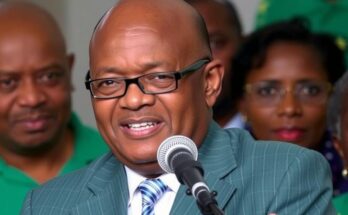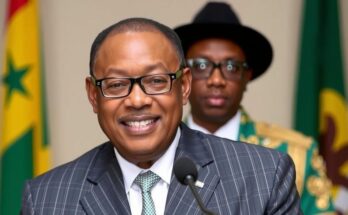Tunisia’s presidential election on Sunday represents a pivotal moment following President Kais Saied’s controversial ascent to power. Saied’s leadership has been marked by a decline in civil liberties and political freedoms, leading to a disillusioned electorate and a political landscape marred by rigged perceptions of the electoral process. With a limited candidate pool and the absence of significant opposition, the election underscores a critical juncture for Tunisia’s democratic aspirations and stability.
Tunisia is approaching a pivotal presidential election that will be the first since President Kais Saied’s installation in 2019. Saied, who came to power as an independent without prior political experience, has extended his rule following a controversial self-coup in July 2021, during which he dismissed parliament and assumed full executive power. His presidency has been characterized by a significant decline in civil liberties, restrictions on freedom of expression, and widespread reports of arbitrary arrests targeting dissenters. The political backdrop shows a bleak landscape with rising public disillusionment towards traditional political parties. Despite this disenchantment, observers expect Saied to secure another term, amid widespread accusations that the electoral process is rigged. Tunisia has witnessed a considerable decline in democratic standards since the 2011 Jasmine Revolution, which initially promised a transition to democracy. The country, once celebrated as a beacon of hope following the Arab Spring, had faced ten years of fluctuating governance plagued by governmental instability and economic struggles. Notably, internal conflict within the parliament, growing poverty, and dissatisfaction with dominant political factions, notably Ennahdha, marked this tumultuous period. Nevertheless, Tunisia passed landmark laws aimed at protecting women and combating racism. With such deeply entrenched issues, expectations for the upcoming elections to ameliorate Tunisia’s challenges appear minimal. The list of presidential candidates is strikingly limited, with only three—Kais Saied, a jailed candidate Ayachi Zammel, and Zouhair Maghzaoui, a known Saied supporter—making the contest seem predetermined. Furthermore, the Independent High Authority for Elections, already restructured under Saied’s regime, has drawn skepticism for its conduct. The judiciary’s capacity for impartial action has also been compromised since Saied’s dissolution of the High Judicial Council in February 2022. His appointment of loyalists to oversee judicial processes has raised concerns about the legitimacy and independence of Tunisia’s legal system. Media freedoms have eroded, with critics of the regime facing prosecution under a contentious 2022 law that penalizes any public remarks deemed falsely damaging. Significant voices have been silenced, leading to an environment where political discourse is muted and civil protest has dwindled, despite recent smaller demonstrations against Saied’s governance. Civil society has not been spared; many organizations have been restricted or closed, and activists jailed, stifling their traditional role in fostering democratic engagement. Yet, echoes of resistance remain, with sporadic protests signaling dissatisfaction with the current administration. Overall, this election presents a crucial juncture for Tunisia, as enduring grievances and political fractures coalesce against a backdrop of fears that fundamental democratic freedoms will continue to deteriorate under Saied’s leadership. The implications of this election extend beyond the immediate outcome, potentially influencing the trajectory of Tunisia’s political future.
The upcoming presidential election in Tunisia has heightened stakes due to President Kais Saied’s controversial consolidation of power since he was elected in 2019. Saied’s administration has faced criticism from rights organizations for abuses against civil liberties and the escalation of arbitrary detentions targeting political opponents. The context for this election is framed by a history of political instability, public discontent with party politics, and the decline of democratic frameworks once set in motion by the events of the 2011 Jasmine Revolution. This background establishes an urgent lens through which to analyze the expected outcomes and implications of the electoral process.
In conclusion, Tunisia’s upcoming presidential election comes at a critical moment, reflecting the tumultuous political landscape shaped by Kais Saied’s rule. With expectations that the electoral process may be flawed, alongside a backdrop of diminished civil liberties and a silenced public sphere, the future of Tunisian democracy hangs in the balance. The responses from civil society and the public demonstrate an underlying desire for better governance, though the pathway remains uncertain with Saied poised to maintain power.
Original Source: www.aljazeera.com




